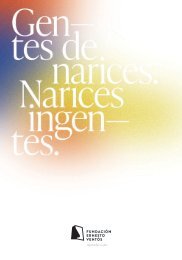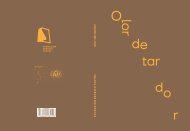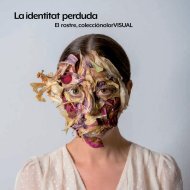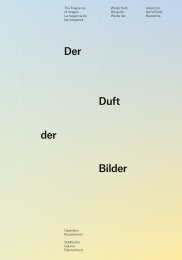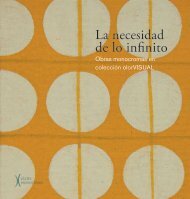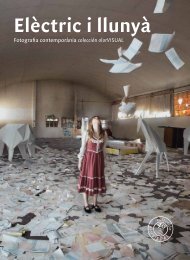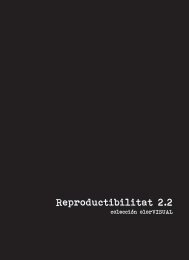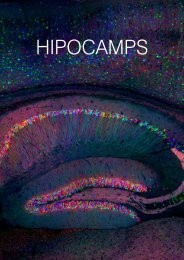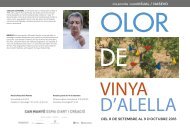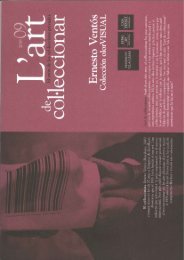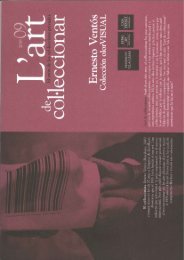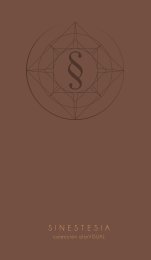Create successful ePaper yourself
Turn your PDF publications into a flip-book with our unique Google optimized e-Paper software.
away. I was moved by the magical power<br />
of the images, and it transported me to<br />
the condition ot hunter and prey, to feel,<br />
to touch the earth with my skin, to depend<br />
on the strength of my body, to orient my<br />
attention by the timeless smell given off by<br />
beings and things.<br />
Antonio Mesenes<br />
Poison noir is a picture and also perfume.<br />
A smell in both cases that takes me into<br />
the intimate and nostalgic world ot<br />
memory, bestowing on me the extract<br />
given off by the greeny black waters o f the<br />
swamp; the green scum of the algae with<br />
the dark mud ot the poo I, the greasy shore<br />
and the backwater, the revitalizing emulsion<br />
it binds together.<br />
Joan Mora<br />
Coffee is the blood of the night<br />
and has in its aroma the heart of its smoke.<br />
Antonio Murado<br />
Joan Brossa<br />
Smell and colour both act on our senses<br />
in similar ways: they both engrave on the<br />
memory a very intense impression.<br />
As I was painting this series of pictures,<br />
I tried to keep with me the memory ot the<br />
odour ot rotting flowers, or that of the<br />
rooms w here apples are left to dry. The<br />
colour would be here the essence of its<br />
intensity, its splendour and its extinction.<br />
Andrés Nagel<br />
In Sanskrit, nasa, 'nose', means perfume.<br />
The indissoluble link between the<br />
nose and perfumes has resulted in perfume-makers<br />
being described as composers<br />
of 'nose', an appellation which these<br />
magicians -capable of identifying and<br />
combining in perfect harmony 3,512<br />
smells- unanimously detest! Snout, beak,<br />
aquiline nose, Bourbon nose, flattened<br />
nose or sn ub nose, our organ of olfaction,<br />
with or without a good sense ot smell,<br />
leads us where it pleases. lt is useless for<br />
you to pretend you are unable to smell:<br />
when the perfume of a woman wafts over<br />
you, mister, you're lost, or on the way to<br />
being: Do not attempt to siam the door in<br />
its face or tweak its nose: the perfume<br />
would laugh in your teeth and you would<br />
take the foolish risk ot having happiness<br />
disappear from under your very nose.<br />
Unless, that is, you adopt the British<br />
maxim which advises you to keep your<br />
nose dean, and take care not to stick your<br />
nose in other people's perfumes, which<br />
would be a pity.<br />
Corne on! Don't make that long face,<br />
but dedicate yourself to the pleasure of<br />
smelling out, whiffing and sniffing up all of<br />
those fine sm ells that exist only in order to<br />
be breathed in.<br />
J uan Navarro Baldeweg<br />
From the cloud hangs its shadow,<br />
which walks behind.<br />
The smell of the field opens the way<br />
ahead.<br />
Miquel Navarro<br />
Concealed, caught, roofless, between wall s.<br />
You die in desire for beauty,<br />
you breathe through perforated walls of<br />
pleasure,<br />
full of plenitude.<br />
You, concealed, caught, between roofless<br />
wall s;<br />
I bite the desire for your beauty.<br />
From the void you breathe, through walls<br />
perforated by your presence,<br />
from pleasure to pain,<br />
from that to plenitude.<br />
Concealed, caught, roofless,<br />
desiring beauty<br />
you breathe between walls<br />
perforated by your presence,<br />
from pleasure to pain,<br />
from pain to plenitude.<br />
Pablo Palazuelo<br />
... of how smell is message, thought and<br />
memory.<br />
... summer afternoon ... full of signs about<br />
the precariousness of time and about<br />
ho pe.<br />
Carlos Pazos<br />
The sm ell of films. «Mon manège à moi» *<br />
1 could swear that the fi rst time I saw it<br />
was in a film by Herzog, since when it has<br />
appeared on a number of other occasions.<br />
lt happened on a patch of waste ground,<br />
in a car cementery or perhaps somewhere<br />
that reminded me of one, or perhaps not.<br />
lt doesn't really matter.<br />
Close to this deserted landscape there<br />
were some fairground booths. In one of<br />
these, in a little cabin like one of those<br />
cheap peep-shows, we found ourselves<br />
witnesses to the anguished and cruel<br />
dance performed by a chicken in a space<br />
delimited by stiff curtains of fake velvet<br />
and lit, of course, by red bulbs. The chicken's<br />
claws ding, with little success, to a<br />
revolving platform, in a vain attempt to<br />
gain some kind of stability.<br />
The smell o f the place was not recorded<br />
on film. For me, it will always be a cocktail<br />
of enchiladas, Mexican beer and airfreshener<br />
spray.<br />
Perejaume<br />
* A song by Edith Piaf, which might<br />
translate as My merry-go-round,<br />
in reference to her up-and-down<br />
relationship with «her man>>.<br />
You ask me to speak to you of the smell<br />
of the fountain of Llorà, but it is not easy<br />
to be sure if you want me to speak to you<br />
ot the real fountain or the painted fountain.<br />
The latter, the painted fountain, in<br />
which the water makes folds of linen as if<br />
it bubbled up dressed and dried, most certainly<br />
has a strong smell of turpentine and<br />
linseed oil. .. On the other hand, I really<br />
could not tell you the smell of the other,<br />
the real fountain.<br />
lt is not a particularty smelly fountain.<br />
Llorà is not one of those fountains that<br />
stink ot the devil's piss, noris it mentholated<br />
by a fragrance of aromatic herbs ...<br />
Although it is more than likely that the<br />
wild boars and other animals find this<br />
fountain by smell, it is not the smell that<br />
takes us there. Nor do we manage to find<br />
it by sight, amid that dense growth of<br />
poplars and hazelnut trees that box it in,<br />
but by the sound. The fountain of Llorà<br />
sounds, in fact, just as if I were to pronunce<br />
its name to you: it is a rising and continuing<br />
sound, like the name «Liorà>>.<br />
,.<br />
'<br />
We know the fountain by its sound,<br />
which is difficult because it always sounds<br />
the same, because the sound dances there<br />
like a flame, but does not change.<br />
Víctor Pimstein Ratinoff<br />
Esencia<br />
In contrast to the pallid images which<br />
we generally call «memory>>, there are privileged<br />
moments in which a perfume, an<br />
essence, overwhelms us by surprise, dragging<br />
us violently from the place and the<br />
time we occupy to transport us to a hidden<br />
place, to a forgotten time. The experience<br />
shakes us with the intensity of a<br />
storm, and brandishes in the air in front of<br />
and inside us the ghosts of a lost room, of<br />
a voice, of the light that illuminates other<br />
faces, of a different air.<br />
Thus, for an instant, we have the privilege<br />
of living simultaneously in different<br />
times, of occupying several places at once.<br />
We defy the tyranny ot the present that<br />
enchains us day after day and we relega te<br />
it to its due importance in the continua!<br />
transit of living: that of converting our<br />
desire into memory and our yearning into<br />
nostalgia and imagination.<br />
Du ring those moments life unfolds in<br />
simultaneous and contradictory dimensions<br />
and progressions. We are simultaneously<br />
a 'were' a nd a 'will be'. The present<br />
becomes the body of time, the tense<br />
and vibrant surface on which the reflections<br />
of the changing light of the skies<br />
and the dense light that pushes up from<br />
the depths converge. In that instant, the<br />
world takes on a corporeity so uplifting<br />
and rich, so detailed and precise that<br />
when it passes it leaves us like castaways,<br />
surprised to find ourselves still<br />
alive on the very shore f rom which we<br />
set out.<br />
lt is strangely moving that that perfume,<br />
that intense, fleeting and volatile<br />
essence unleashed by the storm should<br />
be none other than the key giving access<br />
to our memory, to the most profound,<br />
most private territory of our imagination.<br />
The memory makes use of that essence in<br />
order to make itself present, in the way<br />
that a spirit can make use of any body to<br />
manifest itself, leaving us when it vanishes<br />
the full and bitter taste of our own<br />
mortality.<br />
I set out to paint pictures that will be<br />
like those essences: paths giving access to<br />
the materiality of time. I would like them<br />
to be capable of extinguishing themselves<br />
in the moment of being seen, like that perfume<br />
which seems to vanish while it is<br />
really ramifying itself in the dark, working<br />
the depth of our memory.<br />
Like a perfume-maker, the abstractor<br />
of mediaeval alchem y, I set out to distil<br />
essences, to find thàt which seems to be<br />
purest, most permanent in things, the<br />
principie that defines them and eludes<br />
me time and time again. To distil is to do<br />
violence to the integrity ot the material<br />
world, to the apparent integrity of the<br />
memory, it is to fragment it by force, it is<br />
a form of cruelty that renounces the<br />
whole in an attempt to take possession<br />
of that dense and volatile particle in<br />
which the secret ot its being and its ultimate<br />
truth reside.<br />
I hope that my pictures are as unsettling<br />
as a déià-vu, and that they assault<br />
with a contained violence the people who<br />
look at them, obliging them to seek inside<br />
themselves the precise place they claim.<br />
That they should belong to the person<br />
who, on looking at them, makes them so<br />
much his or her own as to feel that the<br />
painter was simply an instrument of the<br />
person who, as spectator, has made use of<br />
him in order to arrive at his or her own<br />
vision.<br />
Víctor Pimstein Ratinoff<br />
Enric Pladevall<br />
In Catalan, alba is a type of wood,<br />
poplar, but it is also the first brightening of<br />
day. The light breaks on the horizon and<br />
splashes with white the black of the night<br />
that vanishes.<br />
Reality has multiple appearances, and<br />
knowing and feeling its subtle shades stimulates<br />
and sharpens the senses.<br />
The poplar tree has a smell and when it<br />
is cut it is as if we were treading the still<br />
dewy earth of daybreak.<br />
The sculpture is hollow inside and has<br />
holes through which the smell of the<br />
poplar can be enjoyed. The power of<br />
attraction, the sensuality, the strength and<br />
the impossibility of arriving at a total<br />
knowledge and understanding of a work<br />
ot art is what I am trying to express, to<br />
suggest.<br />
Jaume Plensa<br />
Olfactive character: Specific odorific<br />
feature which distinguishes and defines an<br />
olfactive torm. For example a chypre with<br />
an animal character, a fougère with an<br />
aromatic character.<br />
(Tex taken from the Dictionnaire du<br />
Charo Pradas<br />
fangage perfumé, Éditions<br />
Quarante Huit Publicité.)<br />
Human means able to smell.<br />
That voluntary and discriminatory act (a<br />
culture reveals itself through the smells it<br />
repudiates) which consists ot smelling the<br />
breeze, the dew, the wind, an armpit or<br />
the aroma ot a cup ot tea demonstrates<br />
the existence ot a healthy olfactory appetitie,<br />
a curiosity or even a nasal greed<br />
which often proves to be incredibly destructive.<br />
Albert Ràfols Casamada<br />
(From the Dictionnaire du<br />
langage perfumé)<br />
My painting entiled Lavender is an<br />
attempt to visually express an olfactive<br />
sensation.<br />
Being a visual art, painting normally<br />
feeds itself on visual sensations and, semetimes<br />
on tactile ones that try to express by<br />
means of texture what the same pictorial<br />
material can produce. For this reason, to<br />
express an olfactive sensation was a problem<br />
of a certain complexity in its planning,<br />
since, in some way, one had to transpose<br />
to visual language a series ot sensations<br />
that do not affect vision.<br />
I chose the perfume of lavender because<br />
I thought it would allow me to move<br />
within a field of connotations which, given<br />
my kind ot painting, would be a bit more<br />
visuallizable.<br />
For the main characteristics of lavender,<br />
I selected its sensation of freshness, of<br />
pure country air, and the visual memory of<br />
the warm tonality of the flower of lavender,<br />
which in the south ot France extends<br />
over enormous expanses of lands, creating<br />
with it a very particular note ot color<br />
within the landscape.<br />
In order to express these sensations I<br />
used very diluted oil paints to dye the can-<br />
158<br />
159



